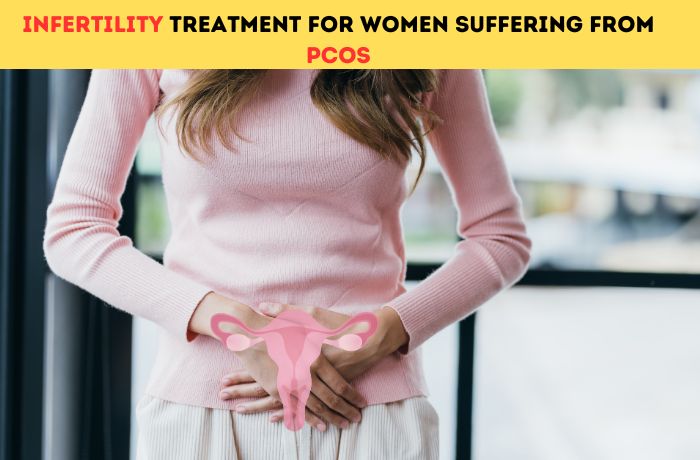Polycystic ovary syndrome (PCOS) is a hormonal imbalance that can affect ovulation, making it difficult for women to conceive naturally. However, there are several effective treatment options available to help women with PCOS achieve pregnancy.
PCOS is a common endocrine disorder affecting 6-12% of women of reproductive age. It is characterized by a combination of symptoms, including irregular menstrual cycles, excessive androgen levels (which can lead to hirsutism and acne), and polycystic ovaries visible on ultrasound. One of the major concerns for women with PCOS is infertility, primarily due to anovulation, where the ovaries do not release eggs regularly.
If you have been diagnosed with PCOS and are struggling with fertility, know that you are not alone and that there are effective treatment options.
The purpose of this blog is to provide you with a complete understanding of infertility treatment options for women suffering from PCOS and to empower you with the knowledge to take informed steps toward achieving your dream of motherhood.
Understanding PCOS and Infertility:
PCOS disrupts ovulation, causing irregular or absent periods. This occurs due to problems with insulin resistance and excess androgen production. Here’s how PCOS can lead to infertility:
- Irregular ovulation: PCOS disrupts the development of follicles in the ovaries, preventing the release of mature eggs.
- Egg quality: The hormonal imbalance can affect egg quality, reducing the chances of fertilization.
Diagnostic Criteria and Evaluation :
The diagnosis of PCOS is typically based on the Rotterdam criteria, which require at least two of the following three features:
- Irregular or absent menstrual periods.
- Clinical or biochemical evidence of hyperandrogenism.
- Polycystic ovaries on ultrasound.
Must Read: Gynecological Disorders that Women Must Never Ignore
Treatment Approaches:
Treatment of infertility in women with PCOS includes several strategies that can be broadly categorized as lifestyle changes, medical treatments, and assisted reproductive technologies (ART). The choice of treatment depends on an individual’s symptoms, overall health, and fertility goals.
1. Lifestyle Changes
Lifestyle changes are often the first line of treatment, especially for overweight or obese women with PCOS. These include
Weight management: Even modest weight loss of 5-10% can improve menstrual regularity and ovulation. A combination of a healthy diet and regular exercise is recommended.
Dietary changes: Maintaining a balanced diet rich in fruits, vegetables, whole grains, and lean proteins while reducing refined sugars and carbohydrates can help manage insulin resistance, which is common in PCOS.
Reduce stress: Too much stress can make PCOS symptoms worse. Yoga, meditation, or other relaxation techniques may be helpful.
2. Medical Interventions
a. Induction of Ovulation
Ovulation induction—a medical procedure that involves stimulating the ovaries to produce eggs—is the main therapy for infertility in PCOS patients.
Clomiphene Citrate: An oral anti-estrogen that triggers ovulation in roughly 80% of women with PCOS, clomiphene citrate is frequently the first medicine recommended. Still, it might not work for everyone.
Letrozole: A first-line aromatase inhibitor, letrozole is being utilized more and more. Research has indicated that it could be a more successful ovulation inducer and live birth provider than clomiphene citrate.
Metformin: Women with PCOS who are insulin-resistant benefit greatly from this insulin-sensitizing medication. To increase ovulation rates, it can be used either by itself or in conjunction with clomiphene citrate.
Assisted Reproductive Technologies (ART):
In vitro fertilization (IVF): This is an effective option for women who are unresponsive to medicine or surgery. In vitro fertilization (IVF) involves retrieving mature eggs, fertilizing them with sperm in a lab setting, and then transferring the resultant embryos into the uterus.
Seeking Expert Care: Dr. Jyoti Kale for Infertility Treatment in Moshi
If you’re in Pune, consider Dr. Jyoti Kale at the Dr. Kale Clinic. Dr. Kale is a renowned Infertility Specialist in Moshi with extensive experience in helping women with PCOS achieve their dream of parenthood. Dr. Kale Clinic provides a supportive environment for your fertility journey with a compassionate approach and advanced treatment methods.
Contact Dr. Jyoti Kale today to schedule your appointment for Infertility Treatment
Conclusion :
Infertility in women with PCOS can be a complex and multifaceted issue, but with a combination of lifestyle changes, medical treatments, and ART, many women can achieve successful pregnancies. Adapting the treatment plan to an individual’s specific needs and circumstances, along with ongoing support from healthcare providers, can optimize outcomes and improve overall quality of life.


